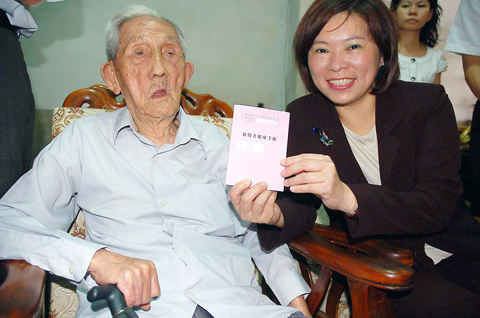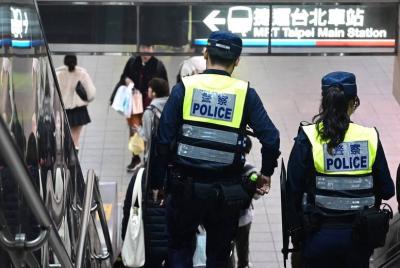Taiwanese doctor Wang Wen-chi (王文其), 92, a survivor of the 1945 Nagasaki atomic bomb blast, finally received compensation from the Japanese government on Wednesday after more than a decade of trying.
Wang became the first and only Taiwanese to receive a “health handbook” issued to survivors of the atomic bomb attacks on Japan during World War II. He is now entitled to free medical treatment in Japan and monthly subsidies of NT$9,000.
“I hope that there will be no more war in the world,” Wang said as he received his health handbook.

PHOTO: YU HSUEH-LAN, TAIPEI TIMES
Japan’s Ministry of Health, Labor and Welfare amended the Atomic Bomb Survivors Relief Law in 2003 to allow atomic bomb victims living abroad to apply for health benefits. However, the victims were still required to undergo a medical check in Japan for confirmation.
Wang applied for survivor benefits four years ago but refused to go to Japan for medical checks, accusing the Japanese government of being insincere. He was finally able to confirm his status through medical checks in Taiwan after Japan amended the law again last year. The Japanese government granted him a survivor health handbook last month.
Wang said he was a 27-year-old student at Nagasaki Medical College in 1945. While he was engaged in practical training at the school’s hospital on the morning of Aug. 9, he saw a flash of harsh red light.
He lost consciousness and was rushed to a nearby clinic operated by a Taiwanese alumnus. Despite receiving medical treatment, Wang remained paralyzed for six months. He and his family then decided to move back to his hometown of Chiayi City.
Wang said the hypocenter of the Nagasaki atomic bomb blast was right behind the hospital he had been working at, and that there were no other Taiwanese survivors at the hospital.
Even some of his fellow students who had been 15km away from the university died of radiation contamination within a few weeks, he said.
Wang remains healthy, even at his advanced age. He joked that perhaps the radiation was protecting him from other diseases.
However, Wang added, he still sets off airport metal detectors as a result of the dose of radiation he had received.

Beijing could eventually see a full amphibious invasion of Taiwan as the only "prudent" way to bring about unification, the US Department of Defense said in a newly released annual report to Congress. The Pentagon's "Annual Report to Congress: Military and Security Developments Involving the People's Republic of China 2025," was in many ways similar to last year’s report but reorganized the analysis of the options China has to take over Taiwan. Generally, according to the report, Chinese leaders view the People's Liberation Army's (PLA) capabilities for a Taiwan campaign as improving, but they remain uncertain about its readiness to successfully seize

Taiwan is getting a day off on Christmas for the first time in 25 years. The change comes after opposition parties passed a law earlier this year to add or restore five public holidays, including Constitution Day, which falls on today, Dec. 25. The day marks the 1947 adoption of the constitution of the Republic of China, as the government in Taipei is formally known. Back then the Chinese Nationalist Party (KMT) governed China from Nanjing. When the KMT, now an opposition party in Taiwan, passed the legislation on holidays, it said that they would help “commemorate the history of national development.” That

Taiwan has overtaken South Korea this year in per capita income for the first time in 23 years, IMF data showed. Per capita income is a nation’s GDP divided by the total population, used to compare average wealth levels across countries. Taiwan also beat Japan this year on per capita income, after surpassing it for the first time last year, US magazine Newsweek reported yesterday. Across Asia, Taiwan ranked fourth for per capita income at US$37,827 this year due to sustained economic growth, the report said. In the top three spots were Singapore, Macau and Hong Kong, it said. South

Police today said they are stepping up patrols throughout the Taipei MRT system, after a social media user threatened to detonate a bomb at an unspecified station this afternoon. Although they strongly believe the threat to be unsubstantiated, Taipei Metro police and the Railway Police Bureau still said that security and patrols would be heightened through the system. Many copycat messages have been posted since Friday’s stabbing attacks at Taipei Main Station and near Zhongshan MRT Station that left three dead and 11 injured, police said. Last night, a Threads user in a post said they would detonate a bomb on the Taipei